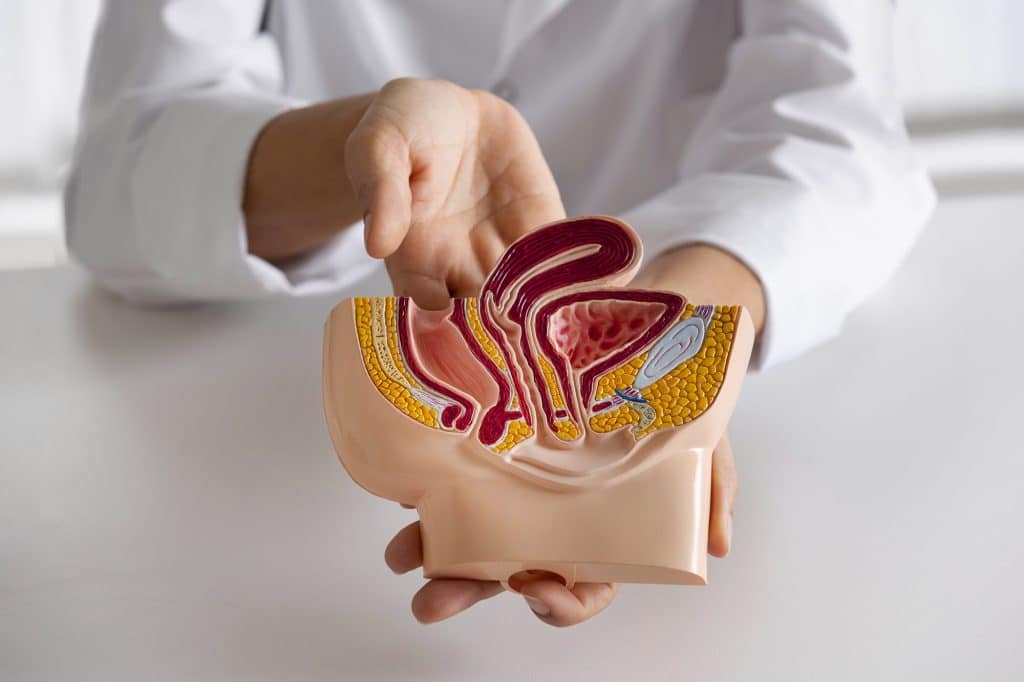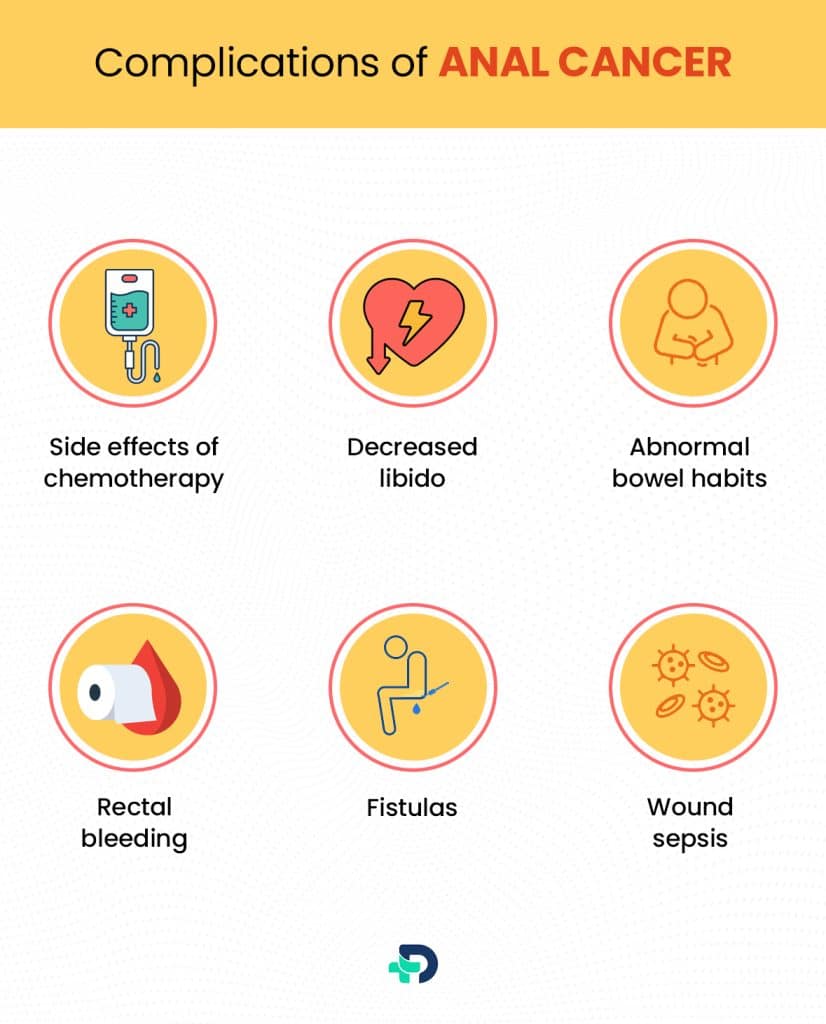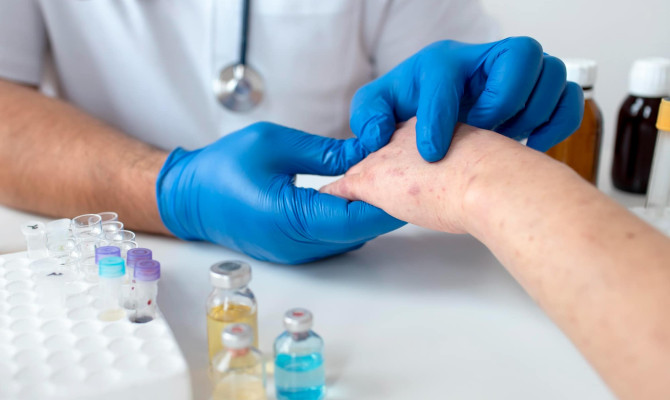Anal Cancer: Causes, Symptoms, Types and Treatment

- Anal Cancer
- 17 Aug 2023
Overview
What is Anal cancer?
Anal cancer is a type of cancer in which the large and last part of the bowel undergoes metastasis.
Although it is a rare type of cancer, in the US it contributes to 2.5% 1Overview| Researched based study from Hopkinsmedicine.org of digestive tract cancers.

Development
Development of Anal cancer
- Rectum is the part of the large intestine where stool is accumulated. The anal canal connects anus with rectum. Sphincter muscles maintain the closure of the anus and prevent the involuntary discharge of fecal matter.
- It is this mucosal layer of anal canal provokes most of the anal cancers.
- Anal cancer is thought to be as a result of human papilloma virus infections with serotypes 16 and 18. It is due to a series of multifaceted inflammatory processes.
- These inflammatory processes occur due to the development of some pre cancerous conditions like Squamous cell carcinoma and Bowen’s disease.
Anal intraepithelial neoplasms
It is widely seen in high risk individuals like those with:
- Human papillomavirus infection
- Bisexual men
- Human immunodeficiency virus infections
- Post-organ transplantation
Under anal intraepithelial neoplasms (AIN) we have
AIN 1
- It is a low-grade precancerous condition involving mild modifications in anal lining. Thus, it is also known as low-grade squamous intraepithelial lesions (LSIL).
AIN 2
- It is a high-grade 2Development| Researched based study from Nlm.nih.gov precancerous condition involving notable changes in the cells lining the anal area. Thus, it is also known as high-grade squamous intraepithelial lesions (HSIL).
AIN 3
- This type involves the most groundbreaking changes in the cells lining the anal area.
- It is also known as anal squamous cell carcinoma in situ (CIS).
These AIN changes will progress to invasive anal cancer.
Causes
Causes of Anal cancer
The literal cause of anal cancer is unknown. But there are a few risk factors that have a high chance of acquiring anal cancer. The causes are:
- Weak immunity
- HPV infection
- Anal fistula
- Autoimmune disorders
- Gender and race
- Age
- Smoking
- Any previous history of cancer
- unsafe and uncommon sex
Weak immune system
- Immune system is weakened to a considerable extent in patients who have just had an organ transplant or those suffering from HIV/AIDS. Thus, Anal cancer is more likely to occur in those who are on immunosuppressive drugs.
Human papillomavirus
- It is a sexually transmitted virus. HPV causes 90% of anal cancers and anal dysplasia. HPV can be transmitted via bodily fluids such as vaginal secretions in females and semen in males. Skin to skin contact is also seen as a mode of transmission of HPV. Serotypes of HPV ie. 16 and 18 are accountable for triggering most of the anal cancers. While other serotypes are known to cause anal warts3Causes| Researched based study from Bccdc.ca
Anal fistula
- The abnormal passage between the anal canal and skin of anus is the anal fistula. This passage secretes serous fluids leaving stains on the clothing. Fistula can bring about irritation and discomfort leading to higher chances of developing anal cancer.
Autoimmune disorders
- Patients who are suffering from autoimmune conditions like Crohn’s disease or psoriasis have the risk of developing anal cancer,
Previous history of cancers
- HPV infection associated with vaginal cancer, cervical cancer and valvular cancer in females have the top grade risk of getting anal cancer.
Gender and race/ethnicity
- Anal cancer is found to be seen in American women and Black men.
Smoking
- People who smoke cigarettes regularly have a higher chance of acquiring anal cancer when compared to non smokers. Risk is reduced when you quit smoking4Causes| Researched based study from Cancer.org
Uncommon Sexual practices
- Engaging in anal intercourse, homosexual intercourse and multiple sexual relationships might lead to anal cancer.
Age
- Common age groups of anal cancer are 50-80 years of individuals.
Frequent anal discomfort
- Anal redness, inflammation and soreness can increase the susceptibility to anal cancer.
Symptoms
Signs and symptoms of Anal cancer
Individuals with low grade dysplasia show less or no significant symptoms. The advanced stages of anal cancer shows up with symptoms such as:
- Bleeding 5Symptoms| Researched based study from Cancer.org per rectum: It is the primary sign of anal cancer.
- Itching and discomfort around the rectum
- Pain around the anal region
- Small mass/lump around the anus
- Mucosal anal discharge
- Loss of bowel and bladder control.
- Inflamed anal lymph nodes
- Feeling of fullness in the anal region
- Change in bowel habits
- Flatus (gas)
- Tissue prolapse
- Weight loss
- Pelvic pain
- Warts presenting as cauliflower like growths.
You must note that these symptoms can also be due to secondary reasons such as hemorrhoids, fistula, anal fissures, anogenital warts etc. So, a thorough evaluation by the doctor is necessary to rule out each cause accurately.
Stages
Stages of Anal cancer
Stage 0
- It is the high-grade squamous intraepithelial lesions (HSIL). The cancerous cells are found in anal mucosa.
Stage 1
- Cancerous cells are present. The size of the tumor will be 2cms or smaller.
Stage 2
- The size of the tumor varies from <2cms to >5cms.
Stage 3
- Cancer spreads to adjacent lymph nodes and involves organs like vagina, bladder etc.
Stage 4
- Cancer has specially spread to lungs and liver. The tumor can be of any size.
Types
Types of Anal cancer
The primary types of anal cancer are:
Carcinoma in situ
- It is the early stage involving the surface layer of anal tissue. It is also known as Bowen’s disease.
Adenocarcinoma
- It involves the glands surrounding the anus.
Squamous cell carcinoma
- It envelopes the cells of anal lining. SCC is the most frequent type of anal cancer.
Skin carcinoma
- In the advanced stages of anal carcinoma, there might be melanoma and basal cell carcinoma also.
Risk factors
Risk factors of Anal cancer
The chances of developing anal cancer are higher in:
- Having multiple sexual relationships
- Untreated anal warts
- HPV : It can be transmitted through vaginal, oral and anal sex
- Anal sex
- Diets devoid of fruits and vegetables
- Bisexual men
- Use of tobacco
- AIDS
- Age: People aging more than 50 years are at risk
- Cigarette smoking
- Long term use of immunosuppressive drugs
Diagnosis
Diagnosis of Anal cancer
Anal cancers can be detected early. The ultimate goal of screening is to know the early stages of cancer.
Screening by Anal pap test
- Screening is done using Anal pap test 6Diagnosis| Researched based study from Cancer.org (anal cytology testing). In this process, a swab from anal cellular layer is taken and looked microscopically.
- It is recommended to do yearly Anal pap tests in already HIV positive patients.
- If the results of Anal pap test come out to be positive then biopsy would be the next best step.
Diagnosis of Anal cancer
Routine examinations upon arrival of symptoms may help early diagnosis of anal cancer.
DARE (Digital anorectal examination)
- It is the examination of rectum and anus. The finger is lubed and inserted into the rectum.
Anoscopy
- It involves the visual inspection of anal canal using an anoscope. Through the short passage of anal canal, the light plastic tube (anoscope) is inserted and examined.
HRA (High resolution anoscopy)
- This diagnostic procedure is highly efficient in diagnosing anal dysplasia. Mucosal layer of anal wall if examined using a magnifying device7Diagnosis| Researched based study from Hopkinsmedicine.org
Biopsy
- During sigmoidoscopy or proctoscopy a small tissue layer is extracted to examine for cancerous cells.
Proctoscopy
- Abnormalities of rectum are detected using a proctoscope. It can be used to extract the cross section. It is a thin tube with a light source and a lens.
Blood tests
HIV test
- If HIV test is positive then HIV treatment is started to stabilize the immune system before initiating cancer treatment.
Imaging tests
These tests cannot detect dysplasia. They are used to know the extent of damage done to the organs.
They are
- X- rays-It helps to know the location of cancer cells.
- Endorectal ultrasound-Although it is an uncomfortable procedure, yet it detects the depth of cancer into or near the anus.
- CT scan-It is done to get precise images of internal organs.
- MRI-Involvement of lymph nodes in anal cancer can be detected by an MRI.
- PET scan-It is performed by injecting FDG (radioactive sugar substance) into the blood. PET scan gives a clear picture of spread of cancer to bones, brain, liver and other organs.
Treatment
Treatment of Anal Cancer
The current trend of treatment for anal cancer is chemotherapy and radiotherapy.
The standard treatment lines include:
Surgery
- Local resection-In this process the tumor is scooped out from the anus with some fresh tissue around the anus.8Treatment| Researched based study from Nlm.nih.gov
- Abdominoperineal resection-This procedure is helpful only in cases of anal cancer recurrence or if some cancer is left out even after chemotherapy or radiotherapy.
Radiation therapy
By using high frequency rays the cancer cells are killed or stopped from multiplying. It can be:
- External radiation therapy-Radiation is sent towards the body area affected with cancer.
- Internal radiation therapy-Radiation is sent directly onto the cancer part using radioactive materials.
Chemotherapy
- Chemotherapeutic drugs are used to block the growth of cancer cells. It can be taken by injecting into the vein or by mouth.
Immunotherapy
- The Patient’s immune system fights with the cancer cells. Pembrolizumab and Nivolumab are the immune checkpoint inhibitors used in treatment of cancer.9Treatment| Researched based study from Nlm.nih.gov
Diet after the treatment for anal cancer
You won’t be able to eat right away after the surgery which was done to resect tumors of anus and rectum. You might feel food intolerance and an upset stomach for the initial few days after the surgery. So you must avoid those foods that might trigger food intolerance.
- Eat smaller portions of meals.
- Choose to eat enough proteins like fish, chicken broth and nuts.
- Avoid indigestion by gulping large amounts of morsels.
- Try to avoid onions, high fiber foods, beer, fizzy drinks, foods rich in fat and canned items. These have the ability to cause wind and lead to discomfort.
- Incorporate white rice, oatmeal, ripe bananas, apples (without skin) in your daily food habits.
Prognosis
Prognosis of Anal cancer
Anal cancer prognosis depends on the
- Size and stage of tumor.
- Metastasis of cancer to the lymph nodes.
Recurrence
- Anal cancer has the potential to recur, thus the treatment lime must be followed promptly. You never miss regular follow ups. The cancer can recur mostly in the liver and lungs.
Prevention
Prevention of Anal cancer
There are preventive measures you can follow to reduce the risk of anal cancer.
Get your HPV vaccination
- HPV infection 10Prevention| Researched based study from Mdanderson.org is the prevalent cause of anal cancer. Thus getting vaccinated is the ultimate cure.
- HPV is effective towards preventing cervical, vaginal, vulvar, penile and anal cancers. The HPV vaccine renders defense against a wide range of cancers in both males and females.
Avoid having sexual intercourse with many partners
- This can prevent both HIV and anal cancer.
Avoid sex with people who have STDs
- Having sex with people who already have STDs will drastically increase your chances of having anal cancer.
Use condoms while having sex
- This will prevent you from getting infected with HPV since HPV can be transmitted from person to person by bodily fluids or skin to skin contact.
Quit smoking
- Smoking cigarettes is a risk factor for acquiring not only anal cancer but other cancers too.
Complications

Complications of Anal cancer
The chief complications include:
- Side effects of chemotherapy
- Decreased libido
- Abnormal bowel habits
- Fistulas
- Rectal bleeding
- Anal strictures
- Wound sepsis
Outlook
The Outlook
Anal cancer is an uncommon malignancy which targets the anal tissues. The primary cause is basically the chronic infection with high-risk strains of HPV ie. HPV 16 and 18.
In summary, medical advancements in achieving detection at an early stage, and treatment options have made significant strides for patients with anal cancer although the diagnosis is challenging. People with anal cancer can attain a good quality of life and long-term survival with proper treatment, emotional care and support.
Any feedback on this article?
 This Articles content was accurate
This Articles content was accurate Very Informative Article
Very Informative Article I have a question or a comment
I have a question or a comment
 This article contains inaccurate content
This article contains inaccurate content This article was not helpful
This article was not helpful I have a question or a comment
I have a question or a comment
We appreciate your helpful feedback!
Checkout our social pages
References
-
Johns Hopkins Medicine
Anal Cancer | Overview
-
National Library of Medicine
Anal intraepithelial neoplasia: diagnosis, screening, and treatment | Development
-
Provincial Health Services Authority
Human Papillomavirus (HPV) / Genital Warts | Causes
-
American Cancer Society
Risk Factors for Anal Cancer | Causes
-
American Cancer Society
Anal Cancer | Symptoms
-
American Cancer Society
Can Anal Cancer Be Found Early? | Diagnosis
-
Johns Hopkins Medicine
Anoscopy and High-Resolution Anoscopy | Diagnosis
-
National Library of Medicine
Local excision for patients with stage I anal canal squamous cell carcinoma can be curative | Treatment
-
National Library of Medicine
Local excision for patients with stage I anal canal squamous cell carcinoma can be curative | Treatment
-
MD Anderson Cancer Center
Human Papillomavirus (HPV) | Prevention




































